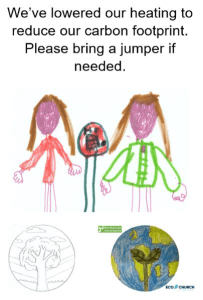

Signs designed by young church
You may have noticed some signs with an eco-theme appearing around the building in the last couple of weeks. They focus on using less energy, by turning off the lights and lowering the heating, and on recycling what we can. Designed by the young church, these signs are intended both to remind those using the building that we are trying to become more environmentally friendly as a church, and to help encourage everyone (including outside organisations using our premises) to do theirbit. Steve Hardiman

Litter pickers
If you frequent the flower room, you may also have noticed a litter-picker stick and heavyduty
gloves on the shelf. These have been newly purchased for those who volunteer in
keeping our car park and flower beds clean, allowing litter to be easily and hygienically
removed. More volunteers are always welcome! Sue Cordery
Lifestyles : Green Money
Money talks, or so it is said. This column has frequently looked at how the way we spend our money on everything from energy and travel to toiletries and Christmas decorations can speak of our concerns and priorities for the environment. Environmental and ethical considerations can also apply when saving and investing our money. Three years ago the Methodist Church fully divested from all fossil fuel companies such as Shell, saying “The pace of change across the oil and gas sector has been inadequate”. The amount of money we individually look after may seem small compared to the Methodist Church’s £1.3 billion (even that’s small in some circles), but we can all play our part. There’s now plenty of information available to help us make these decisions taking more than financial gain into account. Look at Good with money www.good-withmoney.com and the ethical consumer www.ethicalconsumer.org to get started. As demand has grown, many websites and providers of financial services and products now include information on green and/or ethical options.
Most people in UK have a bank account, but many of the well-known banks invest huge sums of money in the fossil fuel industry. So some people boycott these banks, and maybe the pressure is beginning to have an effect – for example, Barclays, the main fossil fuel financer in Europe, recently announced it will cease direct funding of new fossil fuel projects, although this was greeted with scepticism by some. At the other end of the spectrum, Triodos Bank is widely reported to be one of the “greenest” banks, though make sure you know what the basis is for scoring or judging a bank as “green”. The Triodos current account is online only (it has no physical branches) and has a monthly fee, so is probably not suitable for everyone. But if you do want to switch your current account to a greener bank, there’s an industry-wide switching service to make it relatively easy www.currentaccountswitch.co.uk.

For savers there’s an increasing array of green options. You can still expect a return, but it’s likely to be lower than if you ignore environmental or ethical goals such as avoiding supporting the production and trade of arms and weapons. The money you save will be used to fund ethical or environmental initiatives, but again check the small print to avoid greenwashing. Banks offering green savings accounts include Triodos, Paragon and Charity, and in 2021 the government-backed NS&I introduced a Green Savings Bond. An ethical fund allows investment in a range of companies, but there are different types of fund with different objectives. Specifically green funds will avoid companies involved with fossil fuels, and invest in renewables or other companies that mitigate climate change. Other ethical funds may focus more on companies that score well on social factors such as human rights, labour practices, and diversity and inclusion.
Green mortgages are becoming more popular. Some give better interest rates if you live in an energy efficient home, while others include incentives for making green improvements such as improving insulation. However, a green mortgage doesn’t usually say anything about the environmental credentials of the lender.
Whatever you are thinking about doing with your money, the bottom line is to do your research, and make sure the fund or organization is in line with your environmental or other values and principles. And lastly, a disclaimer : this article does not constitute financial advice or an investment recommendation! Roger Day
